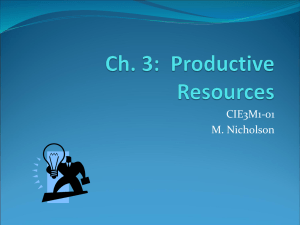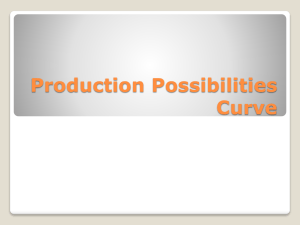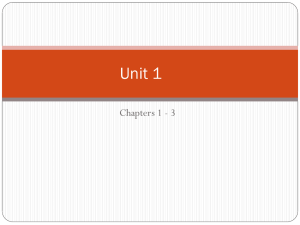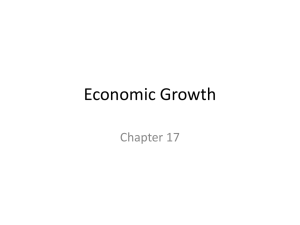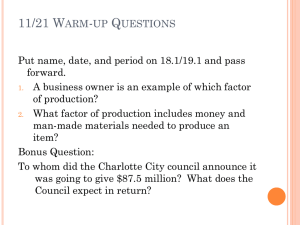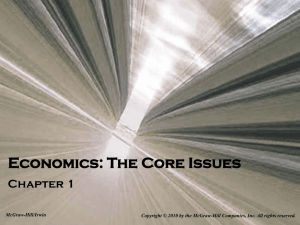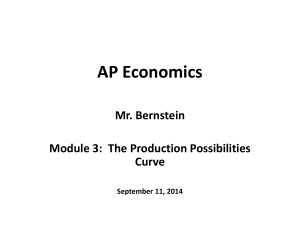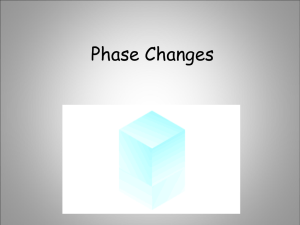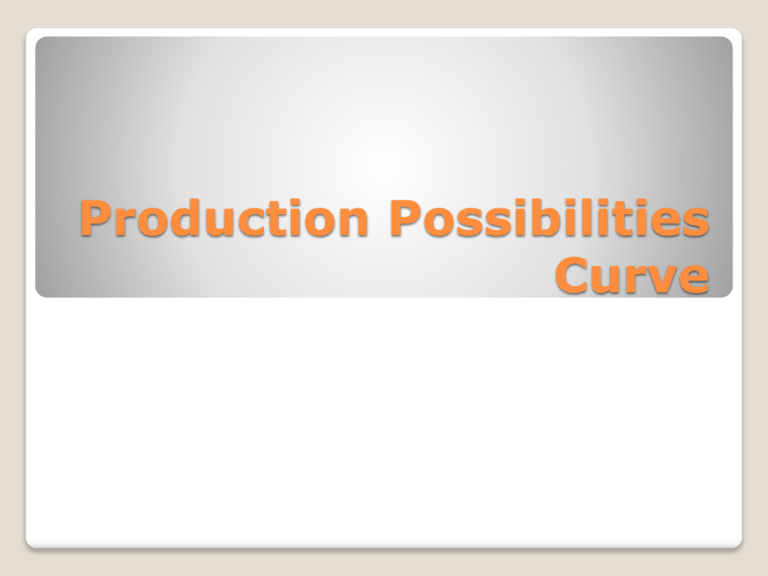
Production Possibilities
Curve
A graph that illustrates the possible
output combinations for an economy
It illustrates the tradeoffs that society
faces in using its scarce resources
◦ A choice is necessary because producing more
of one item means making do with less of the
other
Production Possibilities Curve
The production possibilities model is based
on three assumptions:
◦ an economy makes only two products
◦ resources and technology are fixed
◦ all resources are employed to their fullest capacity
The Production Possibilities Model
Copyright © 2005 by McGrawHill Ryerson Limited. All rights
reserved.
The Production Possibilities
Curve (a)
The production possibilities curve shows a
range of possible output combinations for an
economy.
◦ It highlights the scarcity of resources.
◦ It has a concave shape, which reflects the law of
increasing opportunity costs.
Copyright © 2005 by McGrawHill Ryerson Limited. All rights
reserved.
The Production Possibilities
Curve (b)
Figure 1.1, page 8
Production Possibilities
Schedule
Production Possibilities Curve
a
1000
b
f
Hamburgers Computers
point
on graph
1000
0
a
900
1
b
600
2
c
0
3
d
Hamburgers
900
unattainable
c
600
e
inefficient
d
0
1
2
3
Computers
Copyright © 2005 by McGrawHill Ryerson Limited. All rights
reserved.
Production Efficiency
Achieved when it is not possible
to produce more of one good
without producing less of the
other good
Occurs only at points on the
production possibility curve
Copyright © 2005 by McGrawHill Ryerson Limited. All rights
reserved.
The Law of Increasing
Opportunity Cost
Figure 1.2, page 10
Hamburgers
Opportunity Computers point
Cost of
on graph
Computers
1000
0
a
100
900
1
b
2
c
Production Possibilities Curve
a
1000
As the quantity
of computers
rises, so does their
opportunity cost.
b
900
Hamburgers
Production Possibilities Schedule
c
600
300
600
600
0
d
3
d
0
1
2
3
Computers
Copyright © 2005 by McGrawHill Ryerson Limited. All rights
reserved.
The concept that as more of one item is
produced by an economy, the opportunity
cost of additional units of that product
rises
Law of Increasing Opportunity
Cost
Consider the opposite- what might this
graph suggest? Would it make sense?
Hamburgers
Computers
Why?
Resources are not perfectly adaptable to
all products
(The assumption also is that the two
products are quite distinct)
Reason
Reason:
Specialized resources will not be as
productive after transfer
Each machine/person is specialized in one
area(Resources are specialized)
Thus, resources used are not perfectly
substitutable between both goods
produced
Law of Increasing Opportunity
Cost
Result:
The result is smaller increase in
computers as we transfer resources over
Each computer costs more than the
previous one in terms of hamburgers
Law of Increasing Opportunity
Cost
Examples to explain:
◦ Human resources: At first, switching a few staff
from one department to another isn’t difficult.
However, as you switch more staff, they are
taken away from what they are good at and
require new training for the new job = more
money = higher opportunity cost
◦ Capital resources: As production shifts more
from one good to the next, even more
equipment need to be replaced. Even more
money is needed in this replacement process,
adding to the opportunity cost
Law of Increasing Opportunity
Cost
Further Understanding of the
Opportunity Cost Calculation
Opportunity Cost =
Give up
Gain
Opportunity cost of one computer
= 4-7 televisions = - 3 = -1.5 tv/cmpt
6-4 computers
2
Further Understanding of the
Opportunity Cost Calculation
Production Possibilities Curve
With more
computers, the
curve shifts out
in the next
period.
Hamburgers
1000
0
3
Shifts in Production Possibilities
Computers
Figure 1.2, page 10
Copyright © 2005 by McGrawHill Ryerson Limited. All rights
reserved.
To expand production possibilities
curve – You need economic growth –
but how?
Specific strategies to increase
economic resources
Increase resources by discovery of new
oil and gas deposits (Natural resources)
Increase human resources through
immigration and improving the skills of
the existing workforce
Increase an economy’s capital stock –
devote more resources into producing
more efficient machines and technology.
To Maximize Utility with Scarce
(limited) resources - Production
Possibilities Curve
Determined by economic organization or
the type of economic system a society
chooses to adopt
The economic system adopted will
determine the three most basic economic
questions
There are three basic questions any society
must answer:
◦ what to produce
◦ how to produce
◦ for whom to produce
The Basic Economic Questions
Copyright © 2005 by McGrawHill Ryerson Limited. All rights
reserved.

